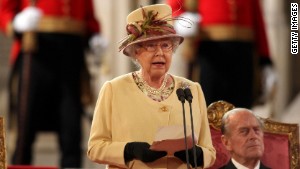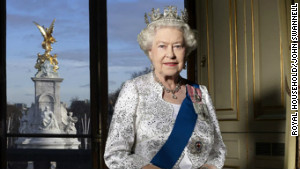GOP candidates focus on Louisiana
A poll released Friday shows Rick Santorum with a comfortable lead
over front-runner Mitt Romney in Saturday's Louisiana Republican
primary, but he was in a mess over remarks he made about President
Obama, which his rivals seized on.
Santorum said Thursday,
"We might as well stay with what we have" in the White House when
comparing Romney to President Barack Obama.
An American Research
Group poll conducted between Tuesday and Thursday showed Santorum
leading Romney by a 43% to 27% margin. Former House Speaker Newt
Gingrich had 20%, and Rep. Ron Paul had 6%.
Santorum's statement
Thursday sought to get more mileage from a Romney adviser's comments
that to shift from the Republican primary to the general election was
like shaking an Etch A Sketch toy, which his rivals were using to
challenge Romney's conservative convictions.
At an event in San
Antonio, Santorum said, "You win by giving people the opportunity to see
a different vision for our country, not someone who is just going to be
a little different than the person in there. If they're going to be a
little different, we may as well stay with what we have instead of
taking a risk in what may be the Etch A Sketch candidate for the
future."
Santorum's rival campaigns seized on the remark.
Rich Beeson, Romney's political director, said Santorum is "becoming the most valuable player on President Obama's team."
At an event in Port
Fourchon, Louisiana, on Friday, Gingrich said, "I obviously have a lot
of disagreements with Gov. Romney, but I think that to suggest that a
Romney presidency would not be dramatically better for any conservative
than an Obama presidency is just plain wrong. Just take the issue of
Supreme Court justices, and the difference between the people that a
Gov. Romney would pick and the people that a President Obama would pick
is night and day. It's a 180-degree difference.
"I hope Santorum is going to clarify it today, because it was clearly a major mistake, and it is a dangerous signal to send."
Santorum spokeswoman
Alice Stewart started the clarification early Friday on CNN's "Starting
Point," saying the former Pennsylvania senator was referring to voters
who might not see the difference between the visions of Romney and the
president, including their stances on health care, government spending
and the Wall Street bailouts.
"What we need in order
for the GOP to win is, we need to have a choice. We need to see a clear
vision that is different from what we currently have," Stewart said.
"And with Mitt Romney, it's the same vision, and it's one that's not the
right direction for this country. And he was worried that voters would
have that feeling."
Santorum later blamed
Romney's campaign for distorting what he said, telling reporters at a
rally in West Monroe, Louisiana, "You guys should do some real reporting
and not what Gov. Romney feeds you."
"I have said repeatedly I
will vote for whoever the Republican nominee is and I will work for
them. Barack Obama is a disaster, but we can't have someone who agrees
with him on some of the biggest issues of the day, and that is the
problem with Gov. Romney: He doesn't provide the clear choice we need,"
Santorum said.
But Gingrich said, "I'm
often cheerful about bashing the media. I don't think the media said
that. I think it was Santorum who said it. So it's a little tricky for
him to attack them for reporting what he said. I'm pretty sure the
videotape shows him saying it."
Romney saved most of his fire for Obama, using the second anniversary of the signing of the president's health care reform plan.
At his first of two
campaign events in Louisiana before Saturday's primary, Romney
methodically picked apart "Obamacare," blaming the president for
stifling economic growth with a law that he said most people want to
repeal.
"You'll note the White
House is not celebrating Obamacare today," Romney told a small audience
inside a New Orleans-area mall, where teenagers were filing past to
catch a morning screening of "The Hunger Games."
"They don't have any big
ceremony going on," he said. "The president is not giving speeches on
Obamacare, and that's for a reason. Most Americans want to get rid of
it, and we're among those Americans. I want to get rid of it, too."
Romney said he will sign
an executive order on the first day of his administration giving states
the ability to opt out of the Obama health care law.
Vice President Joe Biden
went after the Republican field over Medicare in a campaign speech
before an audience of retirees in Coconut Creek, Florida. "If the
Republicans in Congress and their Amen Corner of Romney, Santorum and
Gingrich -- if any one of them get their hands on the White House, the
keys of the White House, I promise you, you will see Medicare ended as
we know it.
"And it is not just about what they want to do to Medicare; it is about the other benefits for seniors that they want to undo."
Romney's lead in a national tracking poll grew to its largest margin in weeks.
The Gallup Poll showed that Romney was supported by 40% of registered Republicans nationwide, with Santorum second at 26%.
Romney's total is the
highest point for any candidate since the daily survey began measuring
support in early November. It represents a 6-point increase since
Tuesday, the same day he won the Illinois primary. Santorum dropped 4
points in the same period. The poll was conducted between Sunday and
Thursday.
Gingrich remained relatively steady at 14%, while Paul had a slight decline to 8%.
All four candidates were campaigning Friday in Louisiana, where 20 delegates are at stake.
Gingrich has spent most of the week campaigning there, hoping to regain the strength he once had in the South.
Gingrich stopped
Romney's early momentum by winning in South Carolina in January. He also
won in Georgia, which he represented in Congress for two decades, on
Super Tuesday, but Santorum won contests in Tennessee, Alabama and
Mississippi.
But no matter how he
finishes in Louisiana, Gingrich shows no signs of ending his campaign,
telling CNN's Piers Morgan that "I'm staying in the race because I
believe we ought to have a conservative who's serious, who's had
national achievements and who doesn't write his policy on an Etch A
Sketch and zig-zag back and forth wildly."
"There may be a morning Gov. Romney has a majority of the delegates," he said. "That morning isn't here."
Romney has 562
delegates, according to CNN estimates, nearly half the 1,144 delegates
necessary to clinch the GOP nomination. Santorum has 249 delegates,
Gingrich has 137 and Paul has 71.


